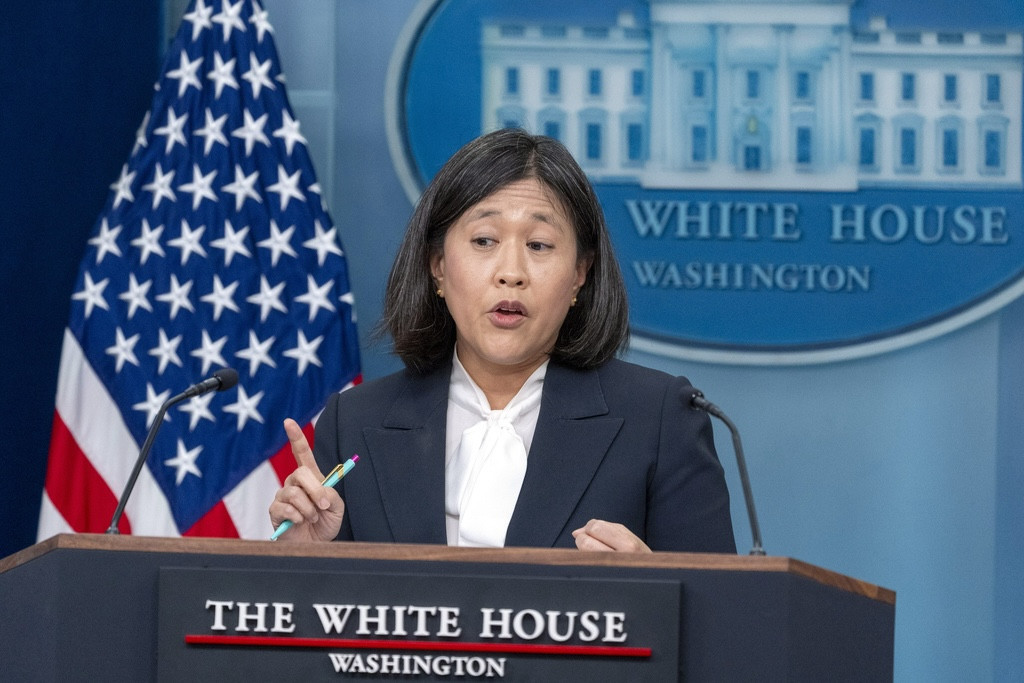

U.S. Trade Representative Katherine Tai made the case for President Joe Biden’s new China tariffs on Wednesday, claiming that not only are they worth the trouble, but they will not cause prices to rise at all.
“First of all,” she said when asked if prices would jump the way they did following Donald Trump‘s tariffs, “I think that that link in terms of tariffs to prices has been largely debunked.”
If so, that’s news to economists.
The Washington Examiner spoke to three economics experts, all of whom disagreed with Tai’s assertion.
“Tariffs are sales taxes on imported goods,” said Douglas Holtz-Eakin, former director of the Congressional Budget Office. “There is an enormous amount of research on sales taxes, and they raise the price paid by consumers. Period.”
He says the Biden White House is wary of giving the impression that its actions will hike prices further than they have already, but “what she said is false.”
“It has not been debunked,” Holtz-Eakin, now president of the American Action Forum, said. “The opposite is true.”
After leaving most of Trump’s China tariffs in place, the Biden administration has announced it will raise tariffs on certain Chinese steel and aluminum products from 7.25% to 25% this year, on Chinese electric vehicles from 25% to 100%, and on semiconductors from 25% to 50% next year.
While the trade-offs could be worth it via stronger U.S. manufacturing and less reliance on a hostile foreign power, the idea that it won’t raise prices doesn’t hold water, according to University of Massachusetts Amherst economics professor Gerald Friedman.
Friedman is a self-described Biden supporter, but could not abide the assertion.
“When you put tariffs on, you raise prices,” he said. “You reduce competition. And that raises prices. Maybe that’s a good thing anyway! But don’t bulls*** us.”
China has made strides in the growing field of electric vehicles, offering a small EV that received praise from the Associated Press for as little as $10,000 brand new. But that vehicle would cost at least twice as much once Biden’s tariffs take effect.
Friedman says the low price is exactly what the tariff is designed to target.
“If that stuff wasn’t cheaper, nobody would be buying it anyway. You wouldn’t need the tariff,” he said. “I don’t know any economist who would say otherwise.”
The rest of Tai’s answer gets into some of the complexities mentioned by Friedman and Holtz-Eakin.
“What the president has instructed that we do is to focus on making our supply chains more resilient,” she said. “That means we need more options. That means here in America, we need to have more manufacturing capacity.”
Tariffs may help that to happen, but at prices that can pay for U.S. worker wages and domestically produced goods.
A third economist, the Bipartisan Policy Center’s Bill Hoagland, offered a more nuanced response hinging on whether Tai meant prices on goods subject to the tariff or prices overall.
“Those who have studied it carefully, e.g., Economic Policy Institute, the Peterson Institute for International Economics, [found] that tariffs have had a small, negligible impact on inflation,” he said.
“On the other hand,” Hoagland added, “if I were in the market for an EV, clearly the China EV would lower my cost. If many of us were in that market … the current tariff today would translate down the road into higher inflation.”
CLICK HERE TO READ MORE FROM THE WASHINGTON EXAMINER
Even if tariffs do hike prices on at least some of the things people buy, the issue may not harm Biden in the 2024 election.
Trump backed tariffs during the 2016 election and implemented them after taking office. He’s now proposing a universal tariff, taxing all goods from foreign producers by 10%.